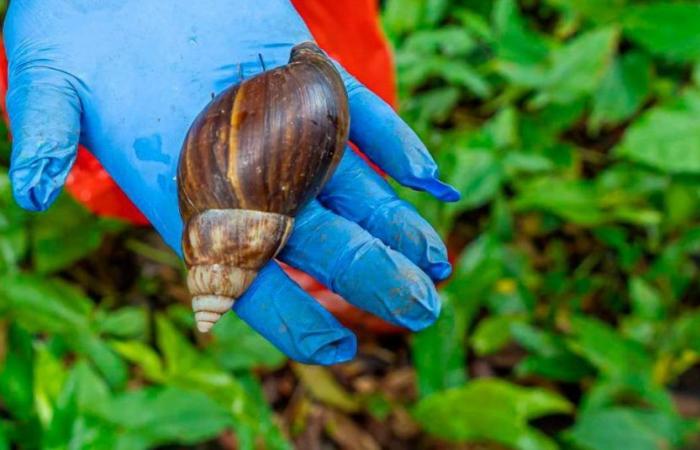The experts and technical staff of the Metropolitan Area of the Aburrá Valley have waged a frontal fight against African and garden snails, invasive species that are expanding throughout this jurisdiction and can cause harm to human health.
So far, this entity has detected 117 critical points due to the presence of this species, in places as diverse as companieseducational institutions, residential complexes, houses and public spaces.
According to Area sources in a statement, these “invasive species that represent a risk to public health due to their ecological, physiological and genetic peculiarities.”
Its reproduction is facilitated by the extensive vegetation and abundance of water sources in the Aburrá Valley. The municipalities from which the most reports have been received are Medellín, Bello, Itagüí and Copacabana.
In addition, there are special characteristics in certain spaces for the proliferation of snails, such as inadequate waste disposalas the availability of shelter and food increases.
“Our call is for other municipalities to raise awareness about this problem and take the necessary precautionary measures to counteract it,” was the call from the leader of the Risk and Climate Change Management Unit of the Aburrá Valley Metropolitan Area, Luz Jeannette Mejía.
We recommend you read: Pilas: there is an alert in the Aburrá Valley due to the proliferation of invasive snails
The other recommendation for all citizens is that Avoid handling them with unprotected hands, or use them as a pet. or bait, and to refrain from consuming them, because contact with these species can cause gastrointestinal diseases, meningitis, tissue inflammation, diarrhea and fever.
Likewise, the Area invited that a proper management of solid waste, disposing of pet feces appropriately, perform constant maintenance on the front gardens and carefully review the plant material acquired in nurseries.
With the aim of decimating snails and preventing any of the negative consequences they bring, until now the Metropolitan Area has attended to 136 requests so far this year; has done 14 trainings9 days of control, 57 days of reception and has collected more than 470 kilos of invasive snails.
The mechanisms to report the presence of these mollusks are the telephone (604) 3856000 and email [email protected]. The name, telephone number, municipality and photographs of the snails must be attached.
The Colombian Agricultural Institute (ICA) has also warned of the damage that the giant African snail can do to the country’s agricultural production, given its ability to reproduce and survive in different environmental conditions, as it can feed on plants, fungi or decomposing organic matter. . Its shell can reach 13 centimeters in length.
Among the management instructions given by that entity are the following:
Do not throw waste or crop residues that could favor the establishment and dispersal of the giant African snail on your property; implement constant monitoring to identify the presence of eggs or already formed individuals, when carrying out the inspection, always wear face masks and protect hands with latex gloves or plastic bags to avoid direct contact with slime and mucous membranes.
Likewise, put the snails in a plastic or glass container and apply salt or lime directly to its body, not on the shell; look for the eggs and place them in a container with salt; wash your hands and forearms very well with soap and water after handling the snail; Do not move plant material containing these mollusks or place dead snails or their remains in water sources or near reservoirs.






